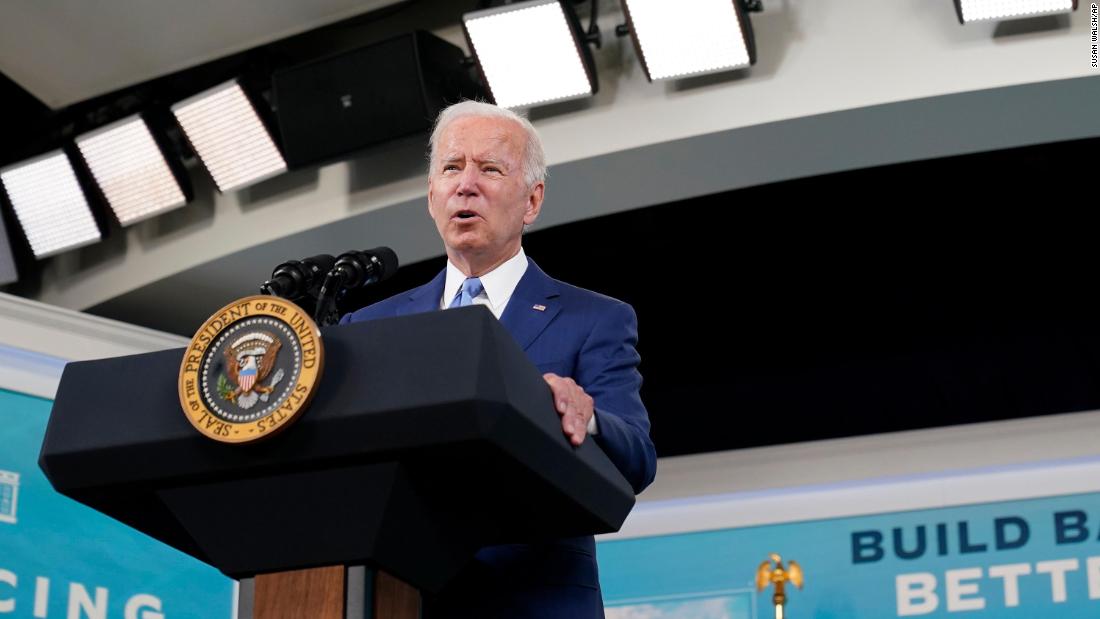The White House is acutely aware of the damaging political impact of the supply chain issue and its consequences for regular Americans
First-term presidents almost always suffer congressional election rebukes, as their actions often energize the opposing party’s supporters against them and any struggles they have can cause their own voters to disengage. This time, with Democrats only possessing the narrowest of majorities in the House and the Senate, they badly need the economy to be racing ahead and the curse of the pandemic to be well behind the country in a year’s time. But a catalog of problems, including a strapped labor market, rising energy prices, climbing inflation, political polarization over vaccines and an immigration crisis at the southern border, are creating a disgruntled national pre-election year mood.
The President sought to offer some light at the end of the tunnel last week, but was careful to point out that Covid-19 was far from going away. He cited “important progress” but added, “Now’s not the time to let up. We have a lot more to do. We’re in a very critical period as we work to turn the corner on Covid-19.”
Biden’s election was in many ways a reaction to the chaos of Trump’s failure to properly manage the pandemic. In fact, the President said so himself in a news conference in March of this year.
“When I took office, I decided that — it was a fairly basic, simple proposition — and that is I got elected to solve problems,” Biden said. “And the most urgent problem facing the American people, I stated from the outset, was Covid-19 and the economic dislocation for millions and millions of Americans.”
By his own benchmark then, and partly due to factors beyond his control, Biden has fallen short. And his diminished approval ratings appear to reflect his own judgment that beating the pandemic was the way he would be judged by voters. If the President cannot argue to Americans next year that he did what he was hired to do, then the traditional gains for the party out of power of the White House could translate into major Democratic losses in Congress.
Buttigieg: Challenges to continue into next year
During the 2020 campaign, Biden’s performance was notable for his command of the scale of the Covid-19 crisis, relentlessly on-message public appearances and an almost Fireside Chat-style in which he came across as taking Americans into his confidence and building their trust. As President, and as the pandemic has dragged on longer than Biden and everyone else expected, he has been less surefooted and his message has lacked the same resonance. The chaotic withdrawal from Afghanistan and Biden’s terse public response, meanwhile, supported the views of critics who concluded his presidency was being overtaken by events.
There are some promising signs on the pandemic. Daily new Covid cases are about half the level of the summer surge and are trending down in almost every state. Deaths are also beginning to decline. It’s likely that economic activity and job creation could spike once the virus ebbs across the country.
On that score, Buttigieg’s comment on CNN’s “State of the Union” is the latest sign that a post-pandemic economic surge that could help mask other issues and persuade voters to stick to Biden’s course is far from certain.
“Certainly a lot of the challenges that we’ve been experiencing this year will continue into next year, but there are both short-term and long-term steps that we can take to do something about it,” Buttigieg told Jake Tapper.
Buttigieg spoke after Moody’s Analytics warned last week that supply chain disruptions “will get worse before they get better.”
Piles of containers backing up at US ports and ships idling offshore waiting to offload are being exacerbated by a post-pandemic shortfall in truckers, meaning this is a problem that is not easy to solve quickly. And the supply chain crunch is causing demand to increase, which in turn causes inflation to rise, which makes the cost of living more expensive and increases pressure on voters’ wallets.
Rising demand fuels inflation
Buttigieg, a rising Democratic political star who might have expected the Transportation Department to offer a comparatively safe political landing spot, now finds himself in the middle of a dicey political crisis.
He actually portrayed the crisis — at least the issue of high consumer demand — as a sign of success for the President.
“Every one of those ships is full of record amounts of goods that Americans are buying, because demand is up, because income is up, because the President has successfully guided this economy out of the teeth of a terrifying recession,” Buttigieg said on “State of the Union.”
The transportation secretary’s appearances on several Sunday talk shows — and a move last week by the President to convene port bosses and unions that led to the introduction of 24/7 operations at the port of Los Angeles — proves that the White House is acutely aware of the damaging political impact of the supply chain issue and its consequences for regular Americans after a grueling year.
“There are $17 billion in the President’s infrastructure plan for ports alone,” Buttigieg told Tapper. He billed the other leg of Biden’s agenda as a critical component of firing up the Covid-slowed economy.
While many of the problems hampering Biden’s presidency do seem intractable, Democrats can at least hope that things will improve by next year. If the US is finally in the endgame of the pandemic, global energy prices ebb, and the supply chain crunch eases as the rest of the world comes closer to beating Covid, voters may feel in a better frame of mind as the midterm elections approach.
But for now, it’s a tough economic picture.
![]()


